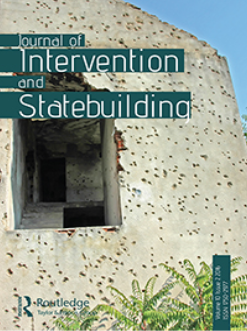Expansive Intervention as Neo-Institutional Learning: Root Causes in the Merida Initiative
Peter Finkenbusch – 2016
Interventions since the 1990s have greatly expanded in policy scope. While neo-liberals understand expansion as an attempt to work on the enabling preconditions of liberal market democracy, Foucauldian governmentality studies see in expansion a set of increasingly intrusive disciplinary techniques of responsibilization. This paper introduces an alternative lens: neo-institutional learning. Through a case study of the Merida Initiative, a US–Mexican security cooperation agreement, the paper argues that expansion grows serendipitously out of the repetitive discovery of new, ‘deeper’ unknowns within a neo-institutional framework of analysis. Importantly, downward penetration requires deconstructing reductionist liberal-universal knowledge claims. Paradoxically, then, the more statebuilders learn (empirically), the less they know (analytically)

